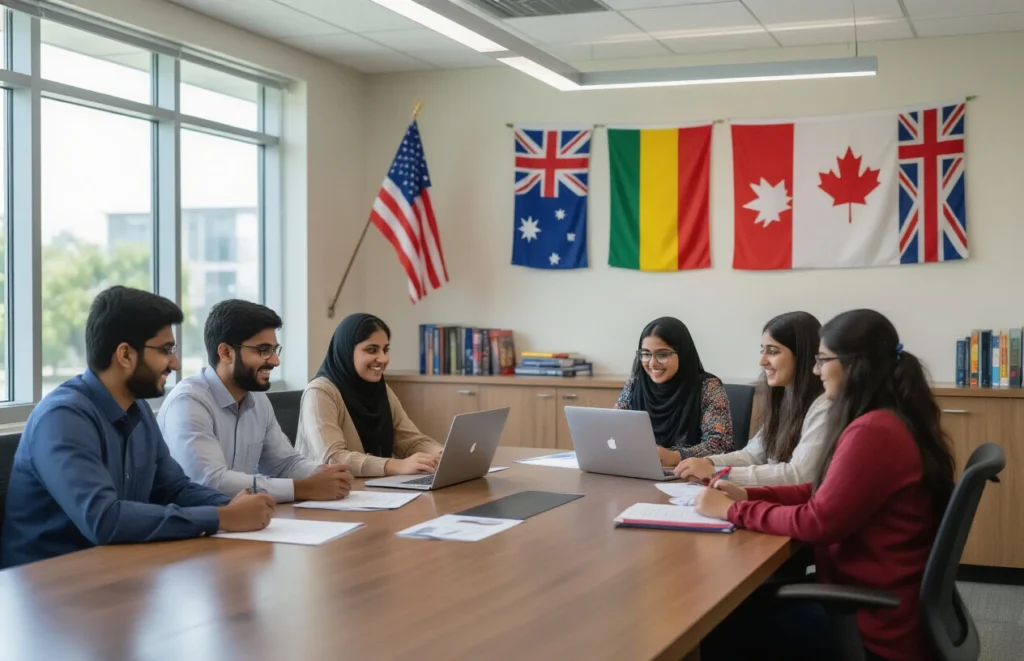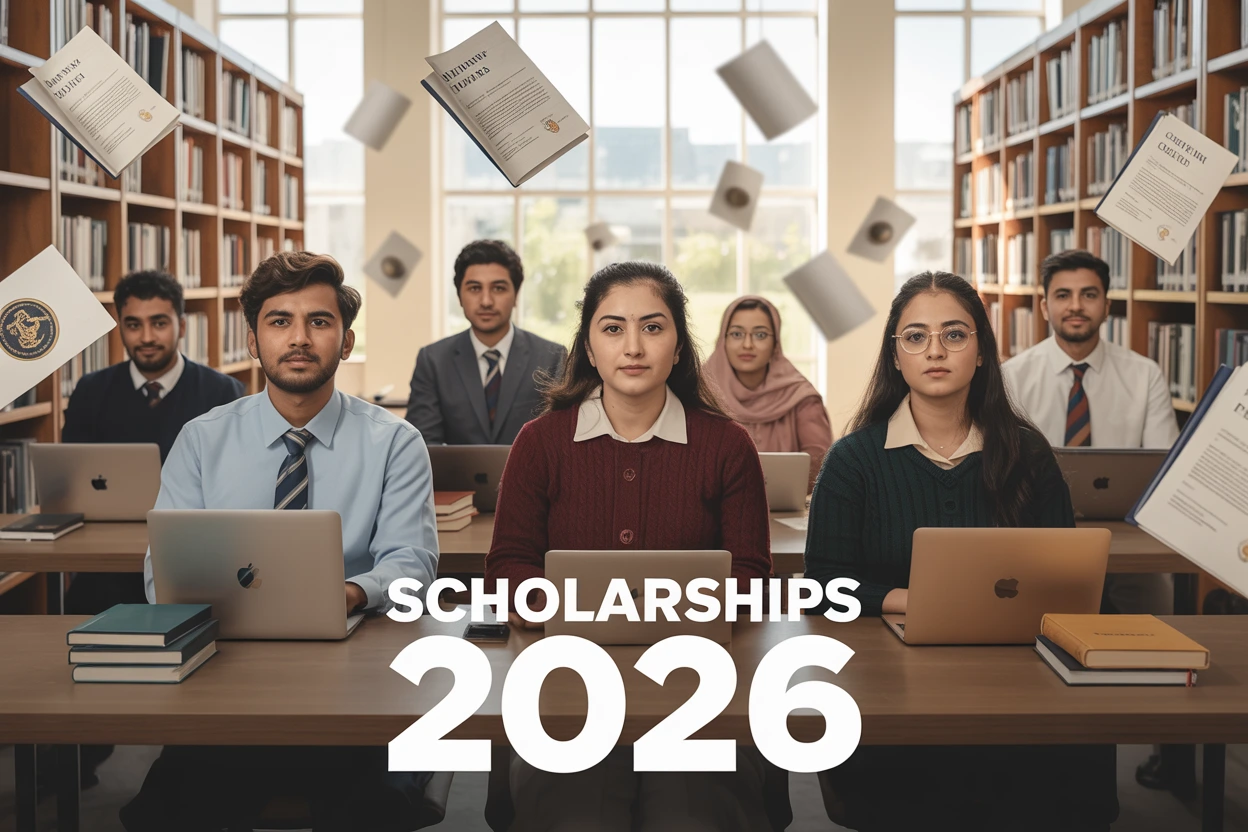Pakistani students seeking higher education funding have exciting new opportunities ahead. The scholarships for Pakistani students 2026 landscape offers expanded government programs, international partnerships, and university-specific awards that can make your educational dreams affordable.
This guide is designed for undergraduate and graduate students from Pakistan who want to secure funding for their studies, whether locally or abroad. You’ll discover the most current Pakistan student scholarships available and learn how to position yourself as a strong candidate.
We’ll walk you through the latest government scholarships Pakistan has launched, including increased funding amounts and simplified application processes. You’ll also explore international scholarships Pakistan students can access, from fully-funded programs in Europe and North America to regional opportunities in Asia and the Middle East.
latest Updates Scholarships for Pakistani Students 2026
Finally, we’ll break down the scholarship application requirements that matter most to selection committees and share practical timeline strategies that successful applicants use to stay organized and meet every deadline.

Government-Funded Scholarship Opportunities
Higher Education Commission (HEC) Merit Scholarships
The Higher Education Commission stands as Pakistan’s primary gateway to educational excellence, offering comprehensive scholarships for Pakistani students 2026 through various merit-based programs. HEC’s flagship scholarship initiative targets outstanding students pursuing undergraduate, master’s, and doctoral degrees both domestically and internationally.
The government scholarships Pakistan program through HEC includes several key opportunities. The Indigenous PhD Fellowship provides full funding for doctoral studies within Pakistan, covering tuition fees, monthly stipends of PKR 40,000, and research grants up to PKR 200,000. International scholarship seekers can access the HEC Overseas Scholarship Scheme, which funds complete degree programs in top-ranked universities across the United States, United Kingdom, Germany, and other developed nations.
Merit based scholarships under HEC require minimum CGPA requirements – typically 3.0 for undergraduate programs and 3.5 for postgraduate studies. Students must demonstrate academic excellence, leadership potential, and commitment to Pakistan’s development. The application process opens annually in January, with selection based on academic records, entrance test scores, and comprehensive interviews.

Prime Minister’s Youth Program Educational Grants
The Prime Minister’s Youth Program represents a transformative initiative designed to empower Pakistan’s young population through accessible education funding. This comprehensive program addresses the educational aspirations of students from diverse socioeconomic backgrounds, making higher education achievable for talented individuals regardless of financial constraints.
Pakistani student funding opportunities through this program include skill development scholarships, professional certification grants, and degree completion support. The program particularly emphasizes technical and vocational training, offering fully-funded courses in information technology, digital marketing, freelancing, and emerging technologies. Students receive monthly stipends ranging from PKR 15,000 to PKR 25,000 during their training periods.
The Youth Business and Agriculture Loan Scheme complements educational grants by providing post-graduation financial support for entrepreneurial ventures. Graduates can access loans up to PKR 5 million at subsidized rates, creating sustainable career pathways. Online application portals streamline the process, with regular intake sessions throughout the year.
Provincial Government Scholarship Schemes
Each province in Pakistan operates distinct scholarship programs tailored to regional educational needs and priorities. These educational grants Pakistan initiatives create localized support systems that understand specific community requirements and cultural contexts.
Punjab’s Chief Minister Merit Scholarship Program offers comprehensive funding for high-achieving students, covering full tuition fees and living expenses for both local and international studies. The program allocates over PKR 2 billion annually, supporting thousands of students across various disciplines. Sindh’s scholarship initiatives focus heavily on technical education and women’s empowerment, providing specialized grants for female students in STEM fields.
| Province | Program Name | Annual Allocation | Focus Areas |
|---|---|---|---|
| Punjab | CM Merit Scholarship | PKR 2 billion | All disciplines |
| Sindh | Technical Education Grants | PKR 800 million | STEM, Vocational |
| KPK | Tribal Area Development | PKR 600 million | Regional development |
| Balochistan | Minority Education Support | PKR 400 million | Inclusive education |
Khyber Pakhtunkhwa’s scholarship programs prioritize students from tribal areas and conflict-affected regions, offering additional support services including counseling and career guidance. Balochistan focuses on minority community education and rural development, ensuring equitable access to quality education across diverse populations.
Need-Based Financial Aid Programs
Need based financial aid programs address the critical gap between academic potential and financial capability. These comprehensive support systems evaluate family income, social circumstances, and individual merit to provide targeted assistance where it’s needed most.
The National Financial Aid Program operates through a transparent selection process, requiring detailed financial documentation and community verification. Eligible families typically earn less than PKR 300,000 annually, with additional considerations for single-parent households, disability circumstances, and geographical challenges. Students receive graduated support ranging from partial tuition coverage to complete educational packages including accommodation and books.
University scholarships Pakistan complement government programs through institutional need-based aid. Major universities like LUMS, IBA Karachi, and GIK Institute offer extensive financial aid covering up to 100% of educational costs for deserving students. These programs often include mentorship opportunities, internship placements, and post-graduation career support, creating holistic development pathways for beneficiaries.
District-level assessment committees evaluate applications using standardized criteria, ensuring fair distribution of resources. The program maintains a 70% success rate in degree completion among beneficiaries, demonstrating effective support mechanisms that extend beyond financial assistance to include academic counseling and personal development programs.

International Scholarship Programs for Pakistani Students
Fulbright Scholarship Program Updates
The Fulbright Scholarship Program remains one of the most prestigious international scholarships Pakistan students can pursue in 2026. This flagship exchange program covers full tuition, living expenses, and travel costs for Pakistani students pursuing master’s and doctoral degrees in the United States.
Recent updates show expanded opportunities in STEM fields, with priority given to applications in engineering, computer science, and renewable energy sectors. The program now includes a pre-departure orientation specifically designed for Pakistani scholars, helping them adapt to American academic culture.
Key benefits include:
- Full funding for 1-2 years of study
- Health insurance coverage
- Monthly stipend for living expenses
- Professional development workshops
- Alumni network access across Pakistan and the US
Application deadlines typically fall in May each year, with selections announced by December. The competition is intense, with acceptance rates around 15% for Pakistani applicants.
Commonwealth Scholarship and Fellowship Plan
Commonwealth Scholarships offer exceptional opportunities for Pakistani student funding opportunities across member countries, particularly the UK, Canada, Australia, and New Zealand. The 2026 cycle introduces new quotas specifically for developing nations, benefiting Pakistani applicants.
The program categories include:
- Master’s scholarships (1 year)
- PhD scholarships (3 years)
- Split-site scholarships (12 months in host country)
- Distance learning scholarships
Priority fields for 2026 applications include climate change research, digital transformation, and public health. The scholarship covers full tuition fees, return airfare, and a generous living allowance. Pakistani students have shown remarkable success rates, with over 200 awards granted annually.
Commonwealth Shared Scholarships, specifically designed for students who cannot afford UK study costs, represent excellent merit based scholarships opportunities with lower competition levels compared to regular Commonwealth awards.
Erasmus Mundus Joint Master Degrees
European Union’s Erasmus Mundus program offers unique mobility experiences through joint master’s degrees delivered by consortiums of European universities. Pakistani students can access these scholarships for Pakistani students 2026 across diverse academic fields.
Popular programs for Pakistani students include:
- European Master in Renewable Energy (EUREC)
- Digital Communication Leadership (DCL)
- Sustainable Transportation and Electrical Power Systems (STEPS)
- Food Innovation and Product Design (FIPDes)
Each scholarship provides €1,400 monthly allowance, travel costs, and full tuition coverage. Students study in at least two different European countries, earning a joint or multiple degree. The application process runs from October to January, with results announced in April.
Pakistani students particularly excel in engineering and technology programs, with success rates reaching 20% in some consortiums. Language requirements vary, but most programs accept English proficiency through IELTS or TOEFL scores.

Australia Awards Scholarships
Australia Awards represent comprehensive government scholarships Pakistan students can leverage for undergraduate and postgraduate studies. The 2026 intake shows increased allocation for South Asian students, particularly in development-related fields.
Scholarship coverage includes:
- Full tuition fees for the duration of study
- Return air travel
- Establishment allowance (AU$5,000)
- Monthly living allowance (AU$3,330)
- Health insurance coverage
Priority study areas align with Pakistan’s development needs: agriculture, education, governance, and infrastructure development. The application process emphasizes leadership potential and commitment to returning to Pakistan post-graduation.
Australian universities actively recruit Pakistani students through education fairs and online sessions. Regional variations exist, with different deadlines for different provinces within Pakistan. Most applications open in February and close in April annually.
Chinese Government Scholarship Scheme
China’s Belt and Road Initiative has significantly expanded educational grants Pakistan students can access through various Chinese Government Scholarship categories. The 2026 opportunities include increased allocations under bilateral agreements between Pakistan and China.
Scholarship categories available:
- Chinese Government Scholarship (full funding)
- Confucius Institute Scholarship (language and culture studies)
- Provincial Government Scholarships (regional programs)
- University-specific scholarships (institutional awards)
Chinese universities now offer more English-taught programs, reducing language barriers for Pakistani students. Popular destinations include Beijing, Shanghai, and Guangzhou, with emerging opportunities in western Chinese cities offering lower living costs.
The scholarship covers tuition fees, accommodation, medical insurance, and monthly stipends ranging from 2,500 to 3,500 RMB. Application deadlines vary by university but typically fall between January and April. Pakistani students show strong performance in engineering, medicine, and business programs across Chinese institutions.
University-Specific Merit and Need-Based Awards
Public University Internal Scholarship Programs
Public universities across Pakistan offer robust internal scholarship programs that provide excellent funding opportunities for deserving students. These merit based scholarships and need based financial aid programs are designed to support both academic excellence and financial accessibility.
The Higher Education Commission (HEC) collaborates with public universities to establish comprehensive funding mechanisms. Universities like University of Punjab, Karachi University, and Quaid-i-Azam University maintain dedicated scholarship offices that process thousands of applications annually. These institutions typically allocate 15-20% of their annual budget toward student financial assistance.
Merit-based awards recognize academic achievement through various criteria including entry test scores, previous academic records, and extracurricular involvement. Students maintaining a CGPA above 3.5 often qualify for partial or full fee waivers. Many universities also offer monthly stipends ranging from PKR 8,000 to PKR 15,000 for outstanding performers.
Need-based programs assess family income, socioeconomic background, and geographic location. Students from rural areas, minorities, and economically disadvantaged families receive priority consideration. Documentation requirements include income certificates, domicile verification, and bank statements spanning the previous six months.
| University | Scholarship Type | Coverage | Monthly Stipend |
|---|---|---|---|
| University of Punjab | Merit & Need | Full tuition | PKR 12,000 |
| Karachi University | Academic Excellence | 75% tuition | PKR 10,000 |
| LUMS SSE | Need-based | Up to 100% | PKR 15,000 |
Private Institution Financial Aid Packages
Private universities in Pakistan have revolutionized university scholarships Pakistan through innovative financial aid structures. These institutions understand that talented students shouldn’t be excluded due to financial constraints, leading to comprehensive support packages.
Leading private universities like LUMS, IBA Karachi, and FAST University offer need-blind admission policies coupled with generous financial aid. These Pakistani student funding opportunities often cover not just tuition but also accommodation, meals, and textbook allowances.
Private institutions typically assess financial need through detailed family financial profiles. The application process involves submitting tax returns, property valuations, and detailed expense breakdowns. Many universities use third-party verification services to ensure accuracy and fairness in award distribution.
Scholarship committees at private universities often include alumni representatives who understand the long-term value of education investment. This perspective leads to more flexible repayment terms and post-graduation support networks. Some institutions offer deferred payment plans where graduates contribute a percentage of their starting salary for a predetermined period.
Work-study programs complement traditional financial aid, allowing students to earn while learning. These positions often align with academic interests, providing valuable professional experience alongside financial support.

Research Assistant and Teaching Assistant Positions
Graduate and undergraduate students can access significant educational grants Pakistan through research and teaching assistant positions. These opportunities provide both financial support and invaluable academic experience that enhances career prospects.
Research assistantships typically require students to work 15-20 hours per week on faculty-led projects. Compensation varies by institution and field, ranging from PKR 20,000 to PKR 40,000 monthly. Students gain exposure to cutting-edge research methodologies while contributing to publications and conference presentations.
Teaching assistant roles involve supporting faculty in course delivery, grading assignments, and conducting tutorial sessions. These positions develop leadership skills and deepen subject matter expertise. Many universities prioritize TAs for future faculty positions, creating clear career advancement pathways.
Department-specific opportunities exist across various fields including engineering, business administration, social sciences, and natural sciences. Students should maintain regular communication with department heads and faculty members to learn about upcoming openings. Building strong academic relationships often leads to recommendation letters and networking opportunities that extend beyond university years.
Application deadlines for RA and TA positions typically fall during the semester preceding the appointment period. Early preparation and strong academic performance significantly improve selection chances.
Field-Specific Educational Grants and Funding
STEM and Engineering Scholarship Opportunities
Pakistani students pursuing science, technology, engineering, and mathematics fields have access to numerous specialized funding programs designed to support the next generation of technical innovators. The Higher Education Commission (HEC) Pakistan offers dedicated STEM scholarships through partnerships with leading global institutions, providing full tuition coverage and living expenses for outstanding candidates.
Major technology companies like Google, Microsoft, and Intel sponsor merit-based scholarships specifically targeting engineering students from developing countries, with Pakistani students consistently ranking among top recipients. These scholarships for Pakistani students 2026 often include internship opportunities and mentorship programs that extend beyond financial support.
The Fulbright Science and Technology Award represents one of the most prestigious opportunities for Pakistani STEM students, covering master’s and doctoral studies at top US universities. Recipients typically receive $25,000-$40,000 annually, plus research allowances and conference travel funds.
Regional programs like the Asian Development Bank-Japan Scholarship Program prioritize engineering and technology students, offering comprehensive funding packages that include health insurance, book allowances, and research grants. Chinese government scholarships through the Belt and Road Initiative provide another avenue, with over 500 annual slots reserved for Pakistani engineering students.
Medical and Healthcare Professional Development Grants
Healthcare education represents a critical priority for international scholarship providers, recognizing Pakistan’s growing medical expertise and global healthcare workforce contributions. The Commonwealth Scholarship Commission offers specialized medical scholarships covering clinical training, research degrees, and professional development programs across UK institutions.
Medical research grants through organizations like the Wellcome Trust and Gates Foundation support Pakistani students conducting health-related research, particularly in areas relevant to developing nations such as infectious disease control, maternal health, and public health policy. These Pakistan student scholarships often include fieldwork opportunities and publication support.
The World Health Organization sponsors fellowship programs for Pakistani medical graduates, providing advanced training in epidemiology, health policy, and clinical specializations. Fellows receive monthly stipends ranging from $2,000-$4,000, plus full educational coverage and professional networking opportunities.
Private foundations like the Aga Khan Foundation offer comprehensive medical education support, covering undergraduate through residency training with particular focus on rural healthcare development and community medicine specializations.

Business and Management Leadership Awards
Business education scholarships recognize Pakistan’s emerging role in global commerce and entrepreneurship. The Chevening Scholarship program maintains strong representation for Pakistani business students, offering one-year master’s programs at prestigious UK business schools with full funding and extensive alumni networks.
MBA scholarships through institutions like INSEAD, Wharton, and London Business School provide targeted support for Pakistani professionals, often requiring 2-3 years work experience and demonstrable leadership potential. These merit based scholarships typically cover $80,000-$120,000 in total educational costs.
The Asian Institute of Management in the Philippines offers specialized business leadership scholarships for South Asian students, emphasizing regional business practices and cross-cultural management skills. Recipients gain access to internships with major Asian corporations and extensive professional mentoring.
Entrepreneurship-focused programs like the Acumen Academy Global Fellowship provide funding for Pakistani business students interested in social enterprise and impact investing, combining traditional business education with practical experience in development finance and sustainable business models.
Arts and Humanities Cultural Exchange Programs
Cultural and artistic education receives significant support through specialized international scholarships Pakistan programs that recognize the country’s rich artistic heritage and contemporary creative contributions. The British Council maintains active cultural exchange scholarships covering fine arts, literature, music, and cultural studies programs across UK institutions.
The Fulbright Creative Arts Fellowship provides comprehensive funding for Pakistani artists, writers, and cultural researchers pursuing advanced degrees or independent research projects in the United States. These fellowships include studio space, exhibition opportunities, and connections with American cultural institutions.
European cultural programs like Erasmus Mundus offer joint master’s degrees in humanities subjects, allowing Pakistani students to study across multiple European countries while receiving full financial support including travel allowances and cultural immersion activities.
UNESCO sponsors specialized scholarships for students focusing on cultural preservation, archaeology, and heritage studies, providing unique opportunities to work on international projects while completing academic programs. These educational grants Pakistan often include field research components and publication opportunities in UNESCO journals and reports.
Application Requirements and Eligibility Criteria
Academic Performance Standards and GPA Requirements
Most scholarships for Pakistani students 2026 require a strong academic foundation, but the specific GPA requirements vary significantly across different programs. Government scholarships Pakistan typically demand a minimum CGPA of 3.0 out of 4.0 or 60% marks in the last degree. However, competitive programs like the Fulbright Scholarship or Chevening often expect much higher standards – usually 3.5+ CGPA or first-class honors.
For undergraduate scholarships, students need excellent results in their intermediate or A-levels, typically 80% or above. Graduate programs are more flexible with GPA requirements, especially for professional experience holders. Some international scholarships Pakistan consider work experience as compensation for slightly lower academic scores.
Here’s a breakdown of typical academic requirements:
| Scholarship Type | Minimum GPA | Additional Requirements |
|---|---|---|
| Government Funded | 3.0/4.0 | Pakistani nationality |
| Merit-based | 3.5/4.0 | Academic excellence certificates |
| Need-based | 2.8/4.0 | Financial documentation |
| International | 3.3/4.0 | Country-specific criteria |
Documentation and Certificate Submission Guidelines
The documentation process for Pakistani student scholarships requires careful attention to detail. Start by gathering your academic transcripts from all institutions attended. These must be official documents with university seals and signatures. Many programs require attested copies from Higher Education Commission (HEC) Pakistan.
Essential documents include:
- Academic transcripts and degree certificates
- CNIC and passport copies
- Birth certificate
- Character certificate from last institution
- Medical fitness certificate
- Police clearance certificate (for international programs)
Professional certificates, internship letters, and work experience documents strengthen your application significantly. Remember that scholarship application requirements often specify document formats – some accept scanned copies while others need original hard copies sent by mail.
Translation requirements are crucial for international applications. Documents in Urdu must be translated by certified translators. Keep multiple copies of everything because some programs don’t return submitted documents.
Language Proficiency Test Requirements
English proficiency tests are mandatory for most international scholarships Pakistan and many domestic programs taught in English. IELTS remains the most widely accepted test, with minimum score requirements typically ranging from 6.0 to 7.5 overall bands.
Popular test options include:
- IELTS Academic: Required score 6.0-7.5
- TOEFL iBT: Minimum 80-100 points
- PTE Academic: Score range 50-70
- Duolingo English Test: Increasingly accepted, especially post-COVID
Some scholarships accept English medium education as proof of proficiency, particularly if you’ve completed your previous degree in English. However, this varies by program and country requirements.
Test preparation takes 2-3 months of dedicated study. Many Pakistani students find IELTS more manageable than TOEFL due to the face-to-face speaking component. Book your test slots early, especially during peak application seasons (September-December).
Financial Need Assessment Procedures
Need based financial aid requires comprehensive financial documentation proving your family’s economic situation. This process is often overlooked but critical for securing funding.
Required financial documents include:
- Family income statements (salary certificates, business income proof)
- Bank statements for the last 6-12 months
- Property ownership documents
- Tax returns (if applicable)
- Affidavit of support from sponsors
The assessment considers total family income, number of dependents, existing educational expenses for siblings, and any outstanding debts or medical expenses. Many programs use income thresholds – families earning above certain amounts may not qualify for need-based aid.
Asset evaluation includes property values, vehicle ownership, and business interests. Some scholarships require detailed asset declarations, while others focus primarily on monthly income. Be honest in your financial disclosures as verification processes are thorough, and false information can lead to application rejection or scholarship cancellation.
Creating a financial narrative explaining your family’s circumstances often helps. Describe any special situations like medical expenses, unemployment, or other factors affecting your family’s financial capacity to support your education.
Strategic Application Tips and Timeline Management

Early Application Submission Advantages
Getting your scholarship applications in early gives you a real competitive edge. Most scholarship committees review applications as they come in, and early submissions often receive more careful attention when reviewers are fresh and have adequate time. Late applications sometimes get rushed reviews during crammed final deadline periods.
Early submission also allows you to catch and fix mistakes before it’s too late. You might discover missing documents, formatting issues, or realize you want to strengthen certain sections. This breathing room can make the difference between a good application and an outstanding one.
Many scholarships for Pakistani students 2026 operate on rolling admission basis, meaning they award funds until money runs out. Popular programs like the Fulbright Pakistan scholarship and various government scholarships Pakistan often exhaust their budgets before final deadlines. Students who apply early secure spots before competition intensifies.
Early applicants also benefit from better communication with scholarship offices. Staff members have more time to answer questions and provide guidance in the beginning months. By deadline time, offices become overwhelmed with inquiries and response times slow down significantly.
Document Preparation and Organization Strategies
Smart scholarship hunters create master folders containing all required documents months before applications open. Start building your portfolio with academic transcripts, standardized test scores, passport copies, and financial statements. Having these ready eliminates last-minute scrambling.
Create digital and physical backup copies of everything. Upload documents to cloud storage and keep hard copies in organized folders. Label everything clearly with dates and scholarship names. This system prevents the nightmare of searching for specific documents under tight deadlines.
Standardize your document formats across applications. Most Pakistani student funding opportunities accept PDF formats, so convert everything once and maintain consistency. Use clear file naming conventions like “LastName_FirstName_Transcript_2026” to stay organized.
Develop template versions of common requirements like personal statements and study plans. While each application needs customization, having strong base templates saves enormous time. You can adapt these templates for different merit based scholarships and need based financial aid programs.
Timeline Creation and Deadline Tracking
Build a comprehensive scholarship calendar starting in January for the following academic year. Research shows students who plan 12-18 months ahead have significantly higher success rates with international scholarships Pakistan. Mark not just final deadlines but also intermediate milestones like test registration dates and transcript request deadlines.
Use digital tools like Google Calendar or specialized apps to track multiple deadlines simultaneously. Set up automatic reminders at 30, 14, and 7 days before each deadline. Color-code different scholarship types – use blue for government programs, green for university-specific awards, and red for international opportunities.
Create buffer zones around major deadlines. If a scholarship is due March 15th, set your personal deadline for March 10th. This approach accounts for unexpected technical issues, postal delays, or last-minute document problems that commonly derail applications.
Break large tasks into smaller weekly goals. Instead of “complete Chevening application,” create specific tasks like “draft leadership essay,” “request recommendation letters,” and “gather financial documents.” This approach makes overwhelming applications feel manageable and maintains steady progress.
Recommendation Letter Procurement Strategies
Start identifying potential recommenders at least four months before your earliest deadline. The best recommendation letters come from people who know your work intimately – professors, supervisors, mentors, or employers who can provide specific examples of your achievements and character.
Provide recommenders with comprehensive packages including your resume, personal statement draft, scholarship details, and specific talking points you’d like them to address. Many busy professionals agree to write letters but need substantial guidance to create compelling content. Make their job easier by being thoroughly prepared.
Follow up diplomatically but persistently. Send polite reminder emails two weeks before the recommendation deadline, then again one week before. Busy recommenders often need gentle nudging, and most appreciate organized students who help them stay on track.
Consider having backup recommenders ready. Sometimes people agree to write letters but fail to deliver due to unexpected circumstances. Having alternatives prevents scrambling for new recommendations at the last minute, especially for competitive university scholarships Pakistan that require multiple letters.
Maintain relationships with recommenders beyond single applications. Strong recommendation letter writers often become valuable long-term mentors who can support future educational grants Pakistan applications and career opportunities.
Pakistani students have access to an impressive range of scholarship opportunities in 2026, from government-funded programs to international exchanges and university-specific awards. These funding options span across various fields of study and cater to both merit-based and need-based applicants. The key is understanding the specific requirements for each program and preparing your application materials well in advance.
Success in securing scholarships comes down to strategic planning and meeting deadlines. Start researching early, gather all required documents, and don’t limit yourself to just one application. Cast a wide net across government programs, international opportunities, and field-specific grants that match your academic goals. With proper preparation and persistence, these scholarship opportunities can open doors to world-class education without the financial burden.
| Scholarship Name | Description | Official Website |
|---|---|---|
| Higher Education Commission (HEC) Scholarships | Government-funded scholarships for higher studies in various fields. | www.hec.gov.pk |
| Fulbright Program (USA) | Fully-funded scholarships for graduate studies in the USA. | www.usefpakistan.org |
| Commonwealth Scholarships | Scholarships for Master’s and PhD programs in the UK. | www.acu.ac.uk |
| Chevening Scholarships | UK Government’s global scholarship program for Master’s degree studies. | www.chevening.org |
| Eiffel Excellence Scholarship (France) | French Government scholarship for international students. | www.campusfrance.org |
| DAAD Scholarships (Germany) | Scholarships for Master’s and PhD studies in Germany. | www.daad.de |
| Swiss Government Excellence Scholarships | Scholarships for research and postgraduate studies in Switzerland. | www.sbfi.admin.ch |
| Australian Awards Scholarships | Scholarships for undergraduate and postgraduate studies in Australia. | www.australiaawards.gov.au |
| Turkish Scholarships (YTB) | Scholarships for undergraduate, Master’s, and PhD programs in Turkey. | www.turkiyeburslari.gov.tr |
| Qatar University Scholarships | Scholarships for undergraduate and graduate programs at Qatar University. | www.qu.edu.qa |
How can I apply for scholarships for Pakistani students?
Answer: The application process typically involves visiting the official website of the scholarship provider, where you’ll find detailed instructions. Most scholarships require you to fill out an online application form, submit your academic transcripts, recommendation letters, a statement of purpose, and proof of language proficiency (e.g., IELTS/TOEFL). Always check the eligibility criteria before applying.
2. What are the eligibility requirements for scholarships for Pakistani students?
Answer: Eligibility varies depending on the scholarship. Common requirements include a minimum academic score, specific qualifications (e.g., Bachelor’s, Master’s, or PhD), and sometimes age limits. Many scholarships also require students to demonstrate English language proficiency and to show leadership potential or a commitment to contributing to society. Always read the scholarship guidelines carefully.
Can I apply for multiple scholarships at the same time?
Answer: Yes, you can apply for multiple scholarships at once as long as the eligibility criteria of each scholarship are met. However, it’s important to ensure that you do not apply for scholarships with conflicting conditions (e.g., two scholarships that provide similar funding for the same period or academic program). Always double-check the terms and conditions for each scholarship.
Are there any scholarships available for undergraduate programs in Pakistan?
Answer: Yes, there are several scholarships for undergraduate students in Pakistan. The Higher Education Commission (HEC) offers a variety of scholarships for both local and international undergraduate students. Additionally, many universities in Pakistan, as well as international organizations, provide scholarships based on merit, financial need, or other criteria
Do I need to have a certain GPA to be eligible for scholarships?
Answer: Many scholarships require a minimum GPA (Grade Point Average) to be eligible. For example, international scholarships like Fulbright or Chevening might require a GPA of 3.0 or higher (on a 4.0 scale) for graduate programs. However, the GPA requirement can vary depending on the scholarship and the level of study. Always check the specific scholarship requirements to confirm the GPA needed for eligibility.

